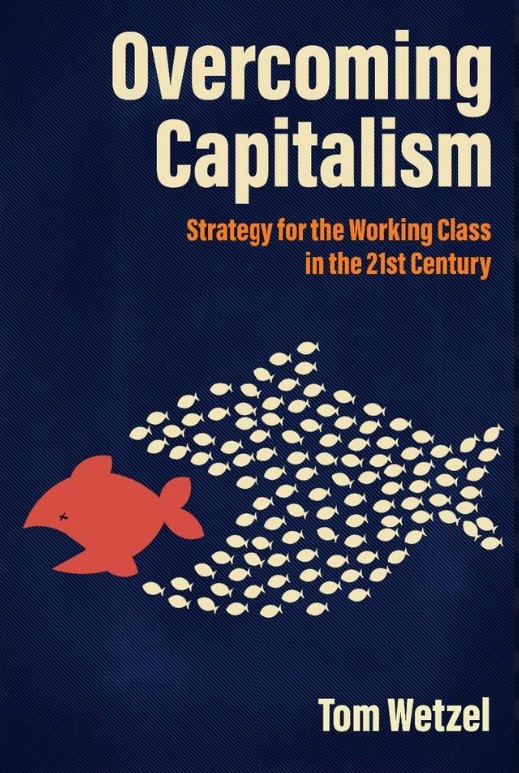Category: Ecology
by Tom WetzelReposted from Workers Solidarity The downward slide of the major (Class 1) American freight railroads in recent years shows how capitalist ownership of the railway system is dangerous and inefficient — and fails to make use of the potential of the railways as a solution to the global warming crisis. Downward slide has been accelerated over the past decade due to the adoption of “Precision Scheduled Railroading” (PSR). This has no precise definition but the aim is to reduce costs. As in “lean production” management theory, any expense not directly needed for profit is regarded as “waste.” PSR is a cost-cutting strategy that puts short-term profits for stockholders as the controlling priority. To maximize the rate of return, the railroads cut corners on maintenance, constantly work to reduce the number of railroad employees, and actively discourage shipments that are less profitable for them to haul. To keep Wall Street investors happy, they work to maximize short term profit. To enrich stockholders, the rail companies have poured billions of dollars into stock buybacks rather than invest in system improvements. Poor Service The federal “common carrier obligation” says railroads are required to provide carload freight service “at reasonable request” —…
From Workers Solidarity By Tom Wetzel I’m going to suggest here that the working class has a unique role to play in the fight against global warming because the owning and managing classes have interests that are tied to an economic system that has an inherent tendency towards ecological devastation whereas the working class does not. In its “Code Red for Humanity” warning in 2021, the UN’s Intergovernmental Panel on Climate Change said: “The alarm bells are deafening, and the evidence is irrefutable: greenhouse‑gas emissions from fossil-fuel burning and deforestation are choking our planet and putting billions of people at immediate risk. Global heating is affecting every region on Earth…” With wreckage from intensifying storms and people dying from heat waves, it might seem that everyone has a stake in the project of ecological sustainability, and bringing a rapid end to the burning of fossil fuels. As we know, however, various sectors of the owning and managing classes pursue profits from fossil fuel extraction, refining, and burning fossil fuels. They protect sunk investments in fossil fuel-based infrastructure (like gas burning power plants) or propose highly implausible strategies (like carbon capture and storage). Thus many sectors of the top classes in…
From ideas & action. By Tom Wetzel As the burning of fossil fuels continues to pump up the size of the carbon dioxide layer in the atmosphere, the global warming crisis becomes ever more acute. In its “Code Red for Humanity” warning in 2021, the UN’s Intergovernmental Panel on Climate Change said: “The alarm bells are deafening, and the evidence is irrefutable: greenhouse‑gas emissions from fossil-fuel burning and deforestation are choking our planet and putting billions of people at immediate risk. Global heating is affecting every region on Earth…” But we’re losing the climate battle thus far. In Climate Change as Class War, Marxist geographer Matthew Huber argues that the climate movement is losing because it is rooted in the “professional class.” He argues that this class lacks the power to defeat the powerful capitalist interests that drag their heals against the kind of drastic cutting back of fossil-fuel burning that is needed. For Huber, the climate movement needs to be rooted in the working class to have sufficient power to enact radical structural reforms needed to effectively fight global warming. Huber analyses the existing climate movement as consisting of three layers. First, there are the “science communicators” like James…
Juristac is the indigenous name for a location in the coastal foothills of California near Gilroy. The site is located on the 403 acre Sargent Ranch. After the Sargent Ranch went bankrupt, a firm bought the ranch and now wants to develop a massive sand and gravel pit on the site — an action that would be devastating for wildlife and destroy the natural beauty of a site that has great significance for the Ahma Mutsun Tribal Band. The Ahma Mutsun Tribal Band are descendants of the indigenous Ohlone-speaking tribe who lived in that part of California at the time of Spanish conquest. Juristac was in roughly the center of the territory of the Mutsun tribe which stretched in the early 1800s from the Pajaro River valley around Watsonville through Gilroy to San Benito County. At the time of Spanish conquest the Mutsun people lived by “proto-agriculture” — cultivating certain plants and engaging in stewardship practices to protect oak and other native forest plants. Juristac has great significance for the descendants of the Mutsun tribe as this was the location where the tribe held their celebrations and religious rituals. The Ahma Mutsun Tribal Band put on a well organized demonstration…

